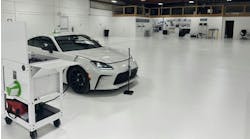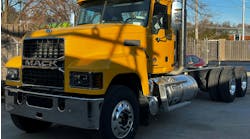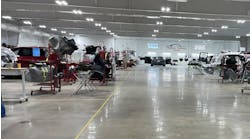With many collision shops seeing their business decline during the recession, and the number of total losses climbing, it's time for shop owners to take a hard look at their cost centers and find ways to reduce those expenses, says Tony Passwater, president of Indianapolis-based consulting firm AEII.
"Most entrepreneurs like the idea of trying to increase sales, and all they do is focus their attention on ways to make more money," Passwater says. "The last few years have made that difficult. It's time to look at costs. Most owners hate that. It's too detailed, its too monotonous. They would rather be the front man, sales guy, that aspect of it, than try to figure out all the details on the accounting end of it. That's why they generally don't do it too often."
In his Sunday session at NACE, "Controlling Costs on Paint and Materials," Passwater explored ways that body shop owners could reduce costs, not just on materials, but also by reducing overhead, adjusting labor pay plans, and establishing more valuable relationships with vendors.
Shops should re-evaluate their vendor relationships annually and determine what kind of value they are receiving from the parts vendors. "To get the best value in pricing, you have to be a good customer," Passwater says. "Which means you've got to pay your bill on time and take advantage of any accounting discounts they have."That doesn't mean you simply go with the lowest-cost vendor, however. "You don't buy cheap," Passwater says. "You have to buy value. You have to compare, apples to apples, not only the goods you are receiving, but also the services the vendor is providing."
Vendors should help the shops make sure parts have been marked and stored properly, and identify any possible damage that occurred during transport.
On the paint and material side, Passwater says most shops don't properly manage material use. "You put systems in place to manage your work inventory versus your stock inventory, and understand how the work in process inventory affects the bottom line when it's not accounted for," he says. Software tools available on the market can help with this, since it is difficult to manually check for any price discrepancies.
Other areas owners should consider:
- Utilities. According to Passwater, utility management companies can help shops get breaks on their utility bills by auditing your utility use and requesting rebates. "And it doesn't cost the shop anything if it doesn't work," Passwater says. "The utility management companies only make money if they save you money. They can negotiate a sizable rebate for past years, and renegotiate rates to save the company moving forward."
- Business structure. Many shops should speak to their accountants and attorneys about ways their corporate structure might be adjusted to save on taxes. By taking rent on the business and drawing against dividends (rather than drawing a large salary), shops could reduce their Social Security costs. And any shop that is still configured as a sole proprietorship should become a limited liability corporation.
- Adjusting health insurance plans to those that utilize health savings accounts or Section 125 plans can also help reduce FICA match costs.
- Shop owners should also revisit their workman's compensation contributions and insurance. "A lot of members in our industry are paying very excessively for their insurance because it hasn't been reevaluated for several years," Passwater says.




